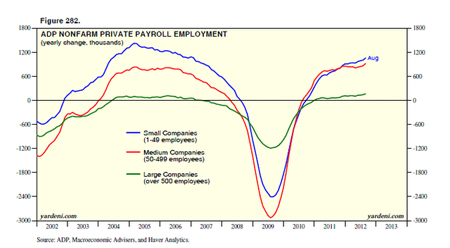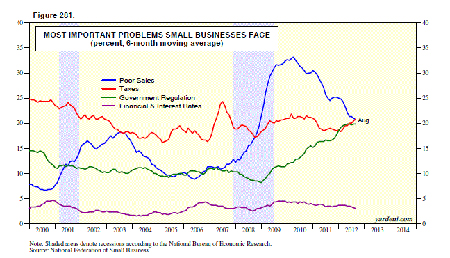
Why can't they all get along and leave well enough alone? The members of the Federal Open Mouth Committee (FOMC) are already yapping away about what they should or should not do after implementing "QE3 Forever" less than two weeks ago on September 13. A few are already pushing for "NZIRP Forever." (NZIRP = near-zero interest rate policy.)
On September 20, FRB Minneapolis President Narayana Kocherlakota said the Fed should target the federal funds near zero until unemployment falls below 5.5 percent as long as inflation doesn't exceed 2.25 percent. Previously, he tended to side with the FOMC's hawks. Now he is even more liberal than FRB Chicago President Charles Evans, a super-dove who has been advocating NZIRP until the jobless rate falls below 7%. Evans can declare victory since that seems to be the new policy implied in the 9/13 FOMC statement, though Fed Chairman Bernanke denied during his 9/13 press conference that there is a specific unemployment rate that is being targeted.
FRB Dallas President Richard Fisher, an outspoken critic of the Fed's unconventional monetary policy leasing programs, is not a voting member of the FOMC this year. However, he undoubtedly lashed out at dissident's views with the public on last Wednesday, September 19, in a speech before the Harvard Club of NYC.
His most sarcastic punch line: "We are blessed at the Fed with sophisticated econometric models and superb analysts. ... The truth, however, is that nobody on the committee, nor on our staffs at the Board of Governors and the 12 Banks, really knows what is holding back the economy. Nobody really knows what will work to get the economy back on course." It was a not-too-subtle dig at Fed Chairman Ben Bernanke's recent Jackson Hole speech, in which he claimed that the Fed's econometric models confirmed that the Fed's previous unconventional policy measures had worked to boost economic growth and lower the unemployment rate, though the jobless situation remained "grave" by his own admission.
Fisher went on to observe that small and medium-sized businesses, "the wellsprings of job creation," are hesitant to expand their payrolls at a more normal faster pace because of regulatory and fiscal uncertainty, not tight credit. Big business, which accounts for much of capital spending, is also stymied by the same concerns and is using NZIRP as an opportunity to borrow cheaply in the bond market to buy back stock rather than to expand. The positive wealth effect on stocks is more than offset by the weakness in capital spending, in Fisher's opinion. I agree.
Movie. "Trouble with the Curve" (+) (link) stars Clint Eastwood as an aging baseball scout for the Atlanta Braves. He doesn't talk to any empty chairs, though he is losing his eyesight in the movie. But at the same time, he is finding out how to get closer to his daughter, whom he neglected when she was growing up. One of the messages of the film is that computer models can't beat common sense. I hope Ben Bernanke goes to see the film and gets this point.
Today's Morning Briefing: Leading & Misleading Indicators: (1) Fed chatter never ends. (2) Fisher vs. Bernanke, Evans, and Kocherlakota. (3) Despite high-powered models, Fed is clueless. (4) A shortage of money isn't the problem for employers. (5) ECRI: There they go again seeing a recession. (6) False alarms and top secrets. (7) Composite indicators can go rogue. (8) Our own formula is no secret. (9) Bad geopolitical vibes and bad global economic indicators. (10) The case for sector neutrality. (11) "Trouble with the Curve" (+). (More for subscribers.)

Dr. Ed Yardeni is the president of Yardeni Research, Inc., a provider of independent global investment strategy research. Yardeni explores trends in the economy and financial markets that are vital to a broad spectrum of investment decision-makers.








